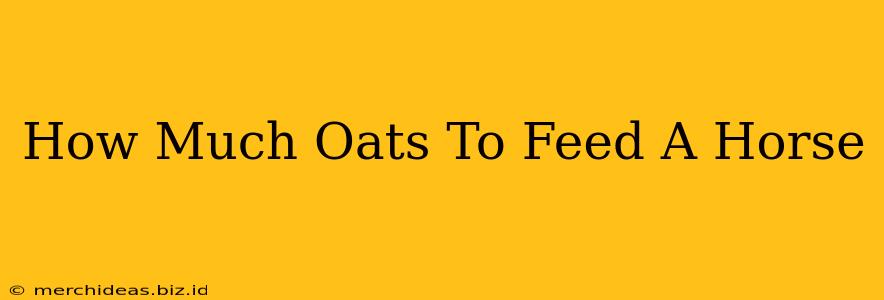Feeding your horse the right amount of oats is crucial for their health and well-being. Getting it wrong can lead to weight problems, digestive issues, and even metabolic disorders. This guide will help you determine the appropriate oat portion for your equine companion, considering factors like their size, activity level, and overall health.
Understanding Your Horse's Nutritional Needs
Before diving into the specifics of oat quantity, it's essential to understand your horse's individual requirements. Several factors influence how much feed they need:
1. Horse Size and Breed:
Larger breeds like Clydesdales naturally require more calories and nutrients than smaller breeds like ponies. A 1,000-pound horse will have vastly different needs compared to a 500-pound horse.
2. Age and Life Stage:
Foals, yearlings, and pregnant or lactating mares have increased nutritional demands compared to adult horses. Their diets will need to be adjusted accordingly.
3. Activity Level:
A horse in heavy work, such as a competition horse or one used for strenuous trail rides, needs significantly more calories than a horse kept in a paddock with minimal exercise. This directly impacts their oat requirements.
4. Body Condition Score (BCS):
Regularly assessing your horse's BCS is vital. A BCS scale typically ranges from 1 to 9, with 5 being ideal. If your horse is underweight (BCS below 4), you'll need to adjust their feed to promote healthy weight gain. Conversely, if they are overweight (BCS above 6), you'll need to reduce their feed intake.
5. Existing Health Conditions:
Certain health conditions, like Cushing's disease or insulin resistance (IR), may require a carefully managed diet with restricted amounts of high-energy feeds like oats. Consult your veterinarian for tailored dietary advice in such cases.
Calculating the Right Oat Portion
There's no one-size-fits-all answer to how much oats to feed a horse. However, a general guideline is to limit oats to no more than 0.5 to 1 pound of oats per 100 pounds of body weight per day. This should be part of a balanced diet including hay, which should form the majority of their food intake.
Example: A 1000-pound horse could receive 5 to 10 pounds of oats daily. However, this is a broad estimate, and you should consult with your veterinarian or an equine nutritionist to determine the precise amount for your horse.
Important Considerations When Feeding Oats:
- Gradual Introduction: Never suddenly change your horse's diet. Introduce oats gradually over several days to avoid digestive upset.
- Type of Oats: Rolled oats are generally preferred over whole oats as they are more easily digestible.
- Storage: Store oats in a cool, dry place to prevent spoilage and maintain their nutritional value.
- Other Feeds: Oats should be part of a balanced diet, not the sole source of nutrition. Ensure adequate hay and potentially other supplements depending on your horse's needs.
- Monitoring: Closely monitor your horse's weight, body condition, and overall health. Adjust the amount of oats as needed to maintain optimal well-being.
The Dangers of Overfeeding Oats
Overfeeding oats can lead to several problems, including:
- Laminitis: A painful inflammation of the laminae in the horse's hoof.
- Obesity: Excess weight can put strain on joints and increase the risk of other health problems.
- Colic: Digestive upset and abdominal pain.
- Hyperactivity: Too many high-energy foods can make your horse restless and difficult to manage.
Always prioritize your horse's health and consult with a veterinarian or equine nutritionist for personalized guidance on feeding oats and creating a balanced diet. They can perform a thorough assessment and provide tailored recommendations based on your horse's specific needs and circumstances.
By carefully considering these factors and consulting with professionals, you can ensure your horse receives the optimal amount of oats for a long, healthy, and happy life.
